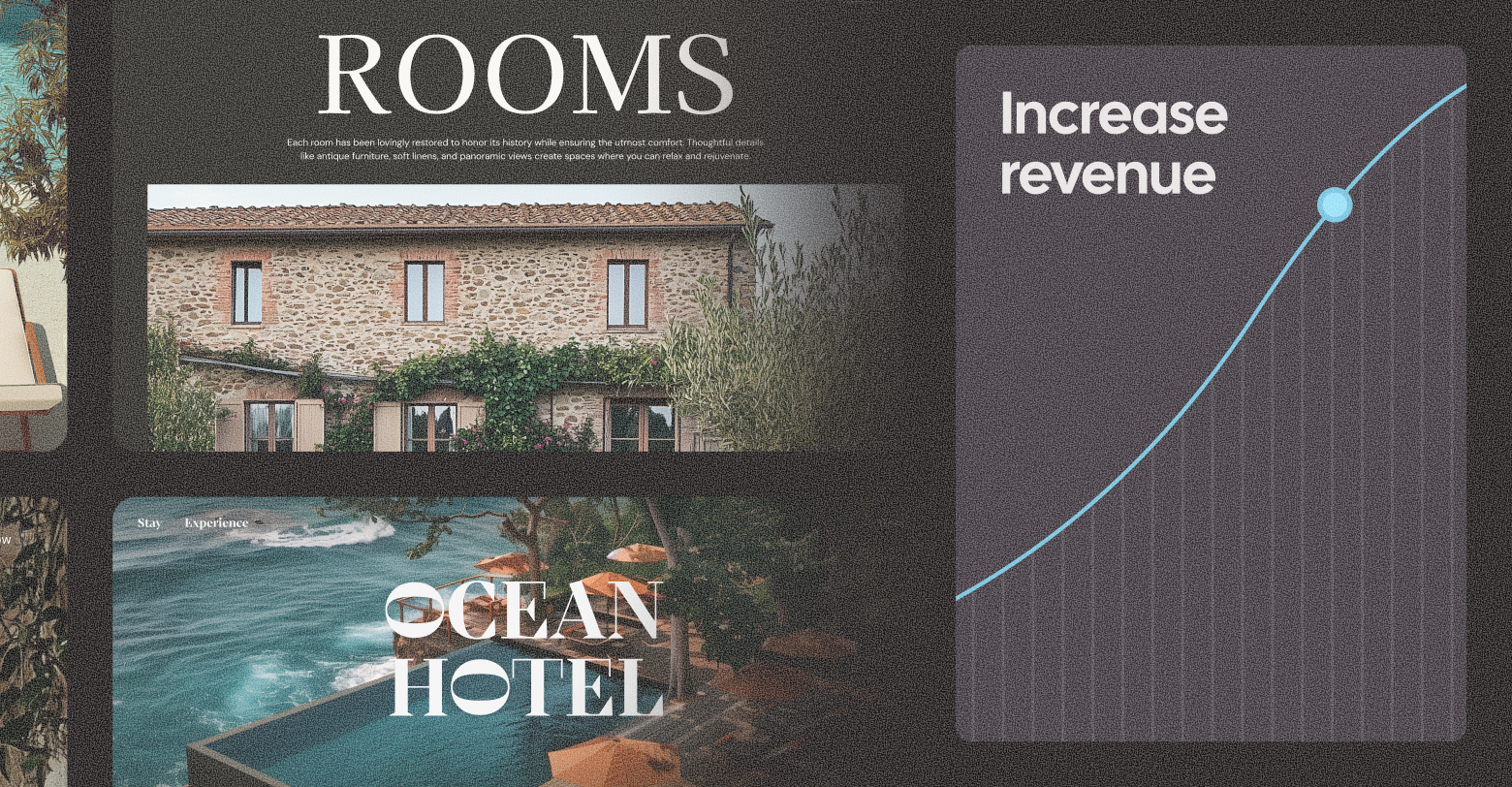By 2034, the
World Economic Forum anticipates that travel and tourism will contribute around $16 trillion in economic activity, nearly 11% of the entire global economy!
For players in the travel and hospitality
SaaS space, more independent hoteliers, tour operators, or other service providers in the industry are in need of top-notch all-in-one solutions to manage the massive uptick in booking requests.
This presents a considerable opportunity for travel and hospitality SaaS platforms that are not already selling websites to their users to break into this space and become the ultimate advocate for small businesses in this industry.
This blog will detail the key challenges that travel and hospitality SMBs face, why SaaS companies going multi-product can address these challenges, why selling websites makes sense for these SaaS companies and how to offer membership websites as a great upsell opportunity. Let’s get started.
Why SaaS companies going multi-product address key challenges faced by travel and hospitality SMBs
SaaS companies can seize a valuable opportunity by expanding their solution offerings to address the challenges their travel and hospitality customers face.
With the ongoing global economic recovery post-pandemic, numerous workers have transitioned to different sectors, posing challenges in recruitment and retention. Moreover, escalating energy prices, labor expenses, and disruptions in the supply chain are driving up costs. In that sense, SaaS companies that embrace a multi-product strategy and provide customers with
all-in-one products that improve
operational efficiency have a significant advantage.
The increasing number of online booking platforms (OTAs) has also created a challenging environment for established travel and hospitality businesses. These platforms make it difficult to stand out and attract new customers. Additionally, the rise in competition from these platforms has led to pressure on these businesses to adjust their pricing, which can affect their overall profitability.
The rising operational expenses, coupled with
growing competition, have fostered an environment in which
innovation is no longer merely a solution but an indispensable necessity for SMBs in the travel and hospitality sphere. Naturally, this dynamic translates into the expectations of what SaaS companies should provide.
By developing integrated suites of solutions, SaaS companies can address the intricate needs of customers in the travel and hospitality sector. A multi-product approach allows SaaS companies to provide comprehensive solutions that not only automate tasks and enhance efficiency to answer the operational cost gap but also empower businesses to differentiate themselves in a crowded market.
Why should travel and hospitality SaaS companies offer websites?
A shift in consumer behavior
As the world becomes more and more digital, having a business website is no longer a nice to have but a necessity for small businesses that want to continue to be in business for the long haul.
Historically, many smaller service providers have had to rely on OTAs, also known as online travel agencies, to drive bookings since many do not have access to booking engines of their own or, in many cases, a digital presence. Some of these providers lack the technical skill sets needed to maintain or build their websites complete with booking capabilities. They depend entirely on large OTAs such as Expedia and Booking.com to stay in business.
While OTAs provide many benefits to hoteliers such as greater brand awareness through advertising and a centralized marketplace for end consumers to book complete travel packages, there has been a shift in consumer behavior to book directly with hoteliers, not through OTAs.
This shift has occurred mainly due to travelers seeking more personalized customer experiences when canceling or rescheduling trips during the pandemic.
Considering end consumers’ desires to book directly with hoteliers, adding a website offering can be extremely beneficial for increasing
product adoption.
Technology adoption
Many travel and hospitality SaaS platforms rely on hoteliers and other service providers having a top-performing website of their own to maximize usage of their technology.
Business expansion
By diversifying into multiple products and introducing a website-building solution in addition to their core product, SaaS companies can seize a distinctive chance to excel in their specialized market and foster business expansion. This approach enables them to deliver added value to customers while broadening the reach and adoption of their platform.
And there’s more…
The addition of a website offering provides a unique opportunity for SaaS platforms in general, and particularly for those in the travel and hospitality sector, to establish
a stronger foothold
within their clients' businesses, and help their clients grow, without dependency on third-party tools.
Examining business outcomes reveals clear advantages, including heightened Customer Lifetime Value (LTV), expanded Total Addressable Market (TAM), and the ability to enter new markets and
geographical locations.
Not all website builders are created equal
Travel and hospitality SaaS providers require very specific features in the website builder they choose to integrate with, in order to fully leverage the benefits mentioned above:
- A white-label website builder - A fully branded experience serving as a seamless extension of the primary platform.
- Integration of APIs to synchronize with the platform and retrieve data like property details and images.
- Comprehensive app integrations tailored to specific industry requirements, and specific features.
- A variety of templates for the travel and hospitality industry need
- Multi-language capabilities
- Advanced SEO functionalities and conversion tools to enhance efficiency and competitiveness in this highly saturated industry.
- Full responsiveness across all device types, given the mobile-oriented nature of this industry's funnel.
For the puzzle pieces to fit perfectly, Travel and Hospitality SaaS providers require integration with a website builder that includes all these functionalities.
Exploring Duda's capabilities
Here at Duda website builder, we are well acquainted with the travel and hospitality SaaS world and offer a tailored experience, encompassing all the features and benefits we’ve discussed.
The Duda website builder provides a means for
vertical SaaS platforms, particularly in the travel and hospitality sector, to seamlessly incorporate Duda into their core services. This opens up the potential for selling websites to emerge as a highly feasible option, creating a new revenue stream and boosting the adoption of existing offerings.
With Duda’s
white-label capabilities, users receive a seamless experience without all the development work needed for the SaaS platform to build out this capability themselves.
Duda provides robust API integration for seamless synchronization with your SaaS platform, allowing the retrieval of data like property details and images. Additionally, it offers a diverse
app store to incorporate industry-specific features such as reviews, ratings, and a Booking search box component. Duda also includes a variety of
templates tailored for the travel and hospitality industry, offering extensive customization options. With multi-language capabilities and full responsiveness, Duda ensures a comprehensive solution for diverse needs.
Duda's
cutting-edge SEO capabilities are the best in the market, ensuring that your customers' websites have everything necessary to thrive in competition.
Provide an even richer experience with membership
While travel and hospitality SaaS platforms will need to determine what types of website packages they want to sell to maximize their partnership with a website builder, one upsell opportunity that every travel and hospitality SaaS company should consider is membership capabilities.
Membership is an extremely hot feature for the hospitality industry due to the incredible value these types of sites bring to end consumers.
If you are unfamiliar with how membership works, the basic idea is to gate a portion or the entirety of a website to provide content, exclusive perks, or discounts that can’t be found anywhere else.
For travel and hospitality SaaS platforms selling these types of websites to hoteliers, the growth potential is huge. Some possible use cases include community forums for niche travel experiences, personalized content based on previous stays booked, discounts for repeat bookings, etc.
Luckily, website-building platforms like Duda can help make selling membership websites simple.
The benefits of creating membership sites on Duda include:
- Full native integration with the Duda platform that can be added to any site
- Ability to track, manage, and remove members easily for your users or ability to allow them to manage their own membership site
- Design flexibility to fully customize signup and login pages for clients depending on their preference
- Templates that are designed for membership, so there’s no need to start from scratch
- Seamless integration with Custom Identity Management Providers, such as Azure, Okta, Auth0, allowing you to sync users between Duda sites and these platforms easily.
- Paid membership capabilities
Key takeaways
Travel and hospitality SaaS platforms looking to take their business to the next level, selling websites is one of the best ways to get started. Adding a website offering can improve the overall adoption of core offerings, add a new revenue stream for the platform, and create a stickier product that users are less likely to churn from.
Contact a Duda expert today for more information on how to begin selling websites.







